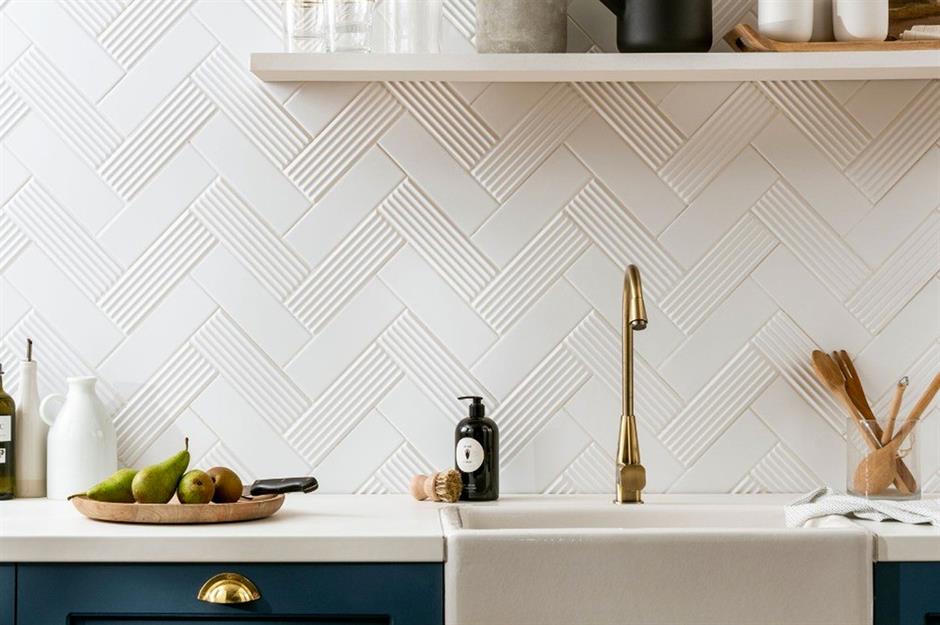Have you ever had the experience of walking into your kitchen and pausing to appreciate your work after cooking a scrumptious meal? The satisfaction you feel can quickly diminish when you notice your dirty, stained kitchen tiles.
It’s a common scenario that can truly dampen your spirits. Grimy kitchen tiles not only affect the aesthetics of your space, but they can also be a breeding ground for bacteria, making your kitchen less hygienic. But there’s no need for despair!
We’ve put together an in-depth guide brimming with expert advice and proven techniques for cleaning your kitchen tiles. Our aim is to help you restore their original shine and make your kitchen a place where you love to spend time.
So, without further ado, let’s dive into the world of effective kitchen tile cleaning!
Understanding Your Tiles: The Key to Effective Cleaning
Your journey towards sparkling clean tiles begins with understanding the type of tile you have installed in your kitchen. Different materials require different cleaning methods. Ceramic and porcelain tiles are common in many kitchens, but you might also encounter natural stone or glass tiles.
Take some time to examine your tiles. Are they smooth and shiny, indicating they could be ceramic or porcelain? Or do they have a unique texture and colour variance, suggesting they might be made of natural stone? Recognising the type of tile you have will guide you in choosing the right cleaning products.
The Importance of Routine Maintenance
Spills are inevitable in a kitchen. When they occur, act quickly! Wipe them up immediately to prevent staining. Remember, the longer a spill sits on your tile, the harder it will be to remove later.
Regular maintenance is your best defence against grime build-up and can significantly extend the life of your kitchen tiles. Here are some key points to consider:
-
Preservation of Aesthetics
Regular maintenance of kitchen floors ensures they retain their original shine and colour, enhancing the overall aesthetic appeal of your kitchen. Over time, dirt and grime can dull the surface of your tiles, but with routine cleaning, you can prevent this and keep your kitchen looking fresh and vibrant.
-
Protection Against Damage
Tiles, particularly those made of natural stone, are susceptible to damage from moisture or harsh chemicals. Regular maintenance, including proper sealing and appropriate cleaning agents, can protect your tiles from such damage, ensuring they remain in good condition for a longer period.
-
Grout Maintenance
The grout between your tiles is porous and can easily absorb dirt, grease, and grime, leading to discolouration and potential damage. Regular cleaning and resealing of grout can prevent these issues, maintaining the integrity and appearance of your tile work.
-
Hygiene and Health
Kitchen tiles, especially those on countertops and backsplashes, come into contact with food particles, water, and bacteria regularly. Routine cleaning is essential to maintain hygiene in your kitchen, preventing the growth of mould and bacteria that can impact your health.
-
Investment Protection
Tiled surfaces can be a significant investment. Regular maintenance not only extends the lifespan of your tiles but also protects this investment, ensuring that your kitchen remains functional and visually appealing for years to come.
Deep Kitchen Tiles Cleaning: Unleashing the Shine
Even the best-maintained tiles need a deep clean occasionally. This is when you’ll need to roll up your sleeves and put in a bit more effort. Here’s how to tackle different types of tiles:
-
Ceramic and Porcelain Tiles: Resilient and Easy to Clean
Ceramic and porcelain tiles are renowned for their long-lasting nature and straightforward upkeep. They have a protective glazed surface that resists stains and can be cleaned with a variety of products.
Create a homemade cleaning solution by mixing 1/4 cup of white vinegar with two gallons of warm water. This is a safe and natural cleaner that is highly effective at cutting through grease and grime.
Mop the tiles with this solution using a microfiber mop or cloth. Avoid using abrasive tools like steel wool or scouring pads, as they can scratch the tile surface. Let the tiles air dry for a naturally streak-free shine.
-
Natural Stone Tiles: Handle with Care
Natural stone tiles, such as granite, marble, or slate, require a bit more care. These materials are porous and can be damaged by acidic or harsh cleaners.
Use a pH-neutral cleaner specifically designed for stone. Apply the cleaner according to the manufacturer’s instructions, then rinse with warm water. Dry the tiles thoroughly with a soft towel or microfiber cloth to prevent water spots.
It’s also a good idea to seal stone tiles regularly to protect them from stains and damage. Sealing fills the pores in the stone, creating a barrier that keeps spills and dirt on the surface where they can be easily wiped away.
-
Glass Tiles: Beauty That Requires Gentle Care
Glass tiles are a popular choice for kitchens due to their modern, sleek appearance. However, they are also known for easily showing water spots and fingerprints. A simple yet effective solution to this issue is a homemade cleaning solution consisting of equal parts vinegar and water.
This mixture is particularly effective at removing these marks and restoring the shine to your tiles. To use this solution, simply spray it onto the tiles and then wipe it off with a microfiber cloth, ensuring you achieve a thorough clean.
In addition to this, it’s important to dry the tiles thoroughly after cleaning to prevent water spots from forming again. A microfiber cloth is ideal for this purpose, as it is highly absorbent and will not scratch your tiles.
-
Grout Cleaning: The Often Overlooked Hero
Grout is the substance used to occupy the gaps between your tiles. It’s porous and can easily absorb dirt, grease, and other stains, making it a challenge to keep clean.
For grout cleaning, a paste of baking soda and water applied with an old toothbrush can be very effective. Simply apply the paste, let it sit for a few minutes, then scrub gently with the toothbrush. Rinse with warm water and dry thoroughly.
If your grout is severely stained, you may need to use a commercial grout cleaner or hire a professional tile and grout cleaning service. Consider sealing your grout after it’s been cleaned to help protect it from future stains.
-
Tackling Stubborn Stains: Regular Cleaning Isn’t Enough
Sometimes, despite your best efforts, stubborn stains refuse to budge. In such cases, you’ll need to bring out the big guns.
One of the most effective ways to remove stubborn stains from tiles is to use a poultice, a soft, moist mass often made from clay, flour, or other absorbent materials. For tile cleaning, a simple poultice can be made from baking soda and water or hydrogen peroxide.
Apply the poultice onto the stain, enclose it with a plastic wrap, and let it sit throughout the night. The poultice will draw out the stain, which you can rinse away the next day. Remember to dry the area thoroughly afterwards.
Aftercare: Maintaining Your Clean Kitchen Tiles
You’ve done the hard work of cleaning your tiles, and now you want to keep them looking their best. Here are a few tips for maintaining your clean kitchen tiles:
- Dry your tiles thoroughly: After cleaning (or any time they get wet), be sure to dry your tiles thoroughly. This helps prevent water spots and mildew growth.
- Seal your grout: Regularly sealing your grout can help prevent staining and make future cleaning easier.
- Use mats or rugs: In high-traffic areas or places where spills are likely (like in front of the sink), consider using mats or rugs. These can catch dirt and spills before hitting your tiles, making cleaning easier.
The Role of Professional Tile Cleaners: When to Call in the Experts
If your tiles are severely stained, damaged, or if you simply don’t have the time to clean them yourself, consider hiring professional tile cleaners. They have the experience, tools, and products necessary to clean your tiles thoroughly and safely.
Professional tile cleaners can also provide services like grout sealing, tile repair, and tile replacement, which can extend the life of your tiles and keep them looking their best.
Conclusion
Keeping your kitchen tiles clean doesn’t have to be a daunting task. With these professional tips, you can maintain a clean and healthy kitchen environment. Regular maintenance, knowing your tile type, and choosing the right cleaning products and methods are key.
Now that you know the best way to clean kitchen tiles, why not give your kitchen a fresh, clean start today? Happy cleaning!

